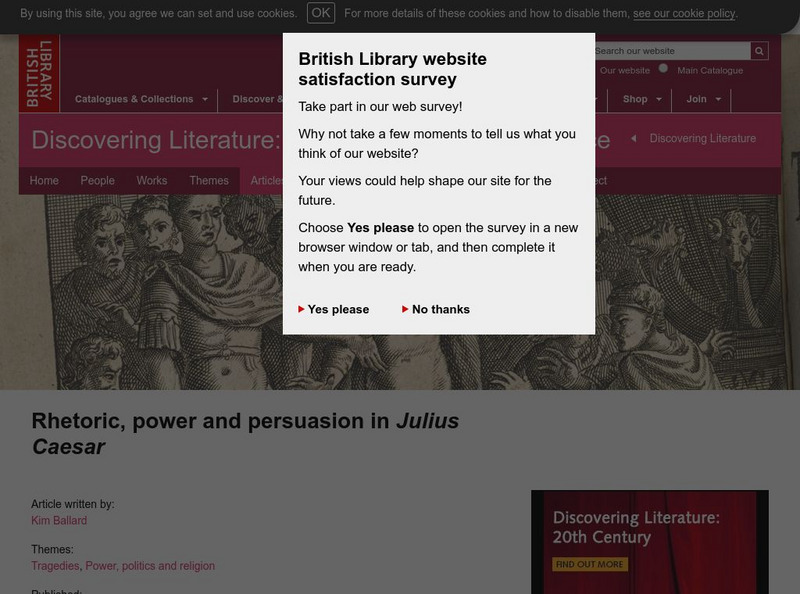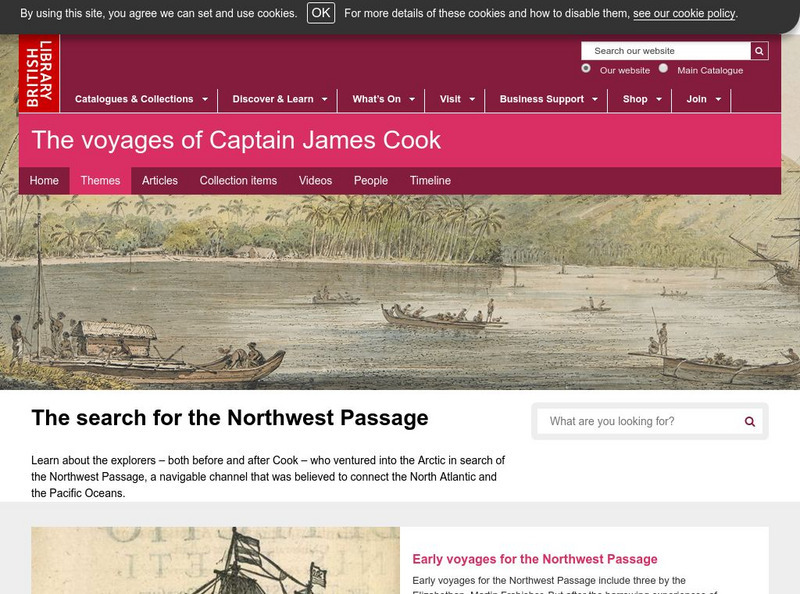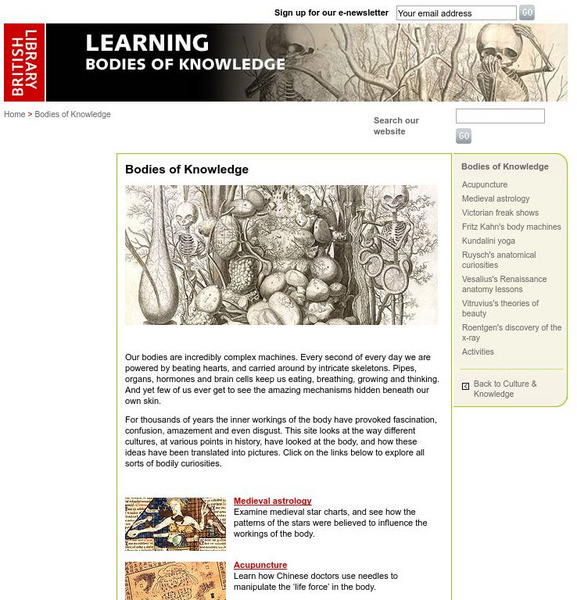British Library
British Library: Rhetoric, Power and Persuasion in Julius Caesar
This article discusses the use of rhetoric in The Tragedy of Julius Caesar and the young Shakespeare's likely education in the art of rhetoric. In Julius Caesar, rhetoric is used to exert power over the commoners, to recruit...
British Library
British Library:northwest Passage: Early Approaches, a Historical Account
Read about the early attempts to find a way through the Northwest Passage. Included are portraits and early maps of the explorers.
British Library
British Library: The Search for the Northwest Passage
Detailed third grade lessons help students understand what skills and knowledge were required in order to become an explorer. Includes specific lessons on John Cabot, Jacques Cartier, and Henry Hudson.
British Library
British Library: The Search for a Northwest Passage
Historical overviews and associated images that document the search, by European explorers, for the elusive Northwest Passage through the North American continent to the Pacific. Discusses, among others, the explorations of Cabot,...
British Library
British Library: Bodies of Knowledge
Series of illustrated essays on the different ways that the human body has been represented in art and science across history considers medieval astrology, the ancient Chinese practice of acupuncture, Vitruvius's notion of body symmetry,...
British Library
British Library: Wordsworth's Lyrical Ballads: A Close Reading
"Lyrical Ballads" grew out of the friendship and artistic collaboration between William Wordsworth and Samuel Taylor Coleridge. In this lesson, learners will explore a number of the poems in light of Wordsworth's key philosophies,...
British Library
British Library: Wilde's the Importance of Being Earnest: A Close Reading
In this lesson, students will consider several aspects of Oscar Wilde's most popular of comedies, "The Importance of Being Earnest". The success of this play is in part due to its examination of moral principles - in this case, the...
British Library
British Library: Tennyson's the Charge of the Light Brigade: A Close Reading
In this activity, students will consider the context within which Alfred Lord Tennyson wrote 'The Charge of the Light Brigade'. The poem immediately captured the public imagination, where it has remained, testimony to heroic failure,...
British Library
British Library: Using Discovering Literature in the Classroom
Written by the English and Media Centre with the Learning Team at the British Library, this free pack shows you how to make the most of the wealth of materials on the Discovering Literature website. Alongside digitized manuscripts and...
British Library
British Library: Shelley's Frankenstein: The Ghost Story Challenge
Students will explore the origins of Frankenstein and place the novel in its context, considering it alongside the contemporary horror stories and scientific developments that influenced Mary Shelley. They will present their knowledge in...
British Library
British Library: Robert Browning: Creative Writing
Looking at three of Robert Browning's poems, students will be encouraged to think critically and create compositions that explore complex themes.[PDF]
British Library
British Library: Hardy's Tess of the D'urbervilles: Fatalism & Sexuality
In this lesson, learners will explore sources related to two key ideas in Thomas Hardy's work: that of people being unable to control their fate, and the imbalance between a man's place and a woman's place in society. Through their study...
British Library
British Library: 'Goblin Market' by Christina Rossetti
In 'Goblin Market', Rossetti employs imagery to explore Victorian debates around sin and temptation. Students will explore these techniques and apply them to their own work.
British Library
British Library:dickens's Oliver Twist:the Criminal World of 19th Century London
This activity encourages students to explore the real-life context of Oliver Twist, using a range of sources to find information about crime in 19th-century London. Students will work in groups to discover: the types of crimes that...
British Library
British Library: Dickens's Oliver Twist:poverty, the Poor Laws and the Workhouse
In this lesson, students will explore aspects of the social and economic background underpinning Oliver Twist and discover Charles Dickens's preoccupations with these subjects not only as a novelist but also as a campaigner.
British Library
British Library: Dickens's Oliver Twist: Depictions of Childhood
This activity will introduce students to influential 19th-century philosophies that construct the nature of the child and childhood itself. Students will examine how Charles Dickens depicts both the character of Oliver and his upbringing...
British Library
British Library: Dickens's Hard Times: Industrialisation
In this activity, students will examine the working lives of those who produced goods in factories, towns, and cities and investigate the social and economic backdrop to Charles Dickens's novel "Hard Times".
British Library
British Library: Bronte's Jane Eyre: Depictions of Childhood
In this activity, students will examine the early experiences of Charlotte Bronte and explore the context of childhood at the beginning of the 19th century.[PDF]
British Library
British Library: Bronte's Jane Eyre: The Figure of Bertha Mason
This activity will encourage students to explore the character of Bertha Mason, Mr. Rochester's first wife, through the lens of medical history. They will compare Charlotte Bronte's presentation of the character with the perspectives...
British Library
British Library: Creative Writing: Ignatius Sancho, Letters of the Late Ignatius
This teaching pack will introduce students to Ignatius Sancho in his own words through a selection of his letters and invite students to offer a variety of creative responses to Sancho's life, work, and unique voice. Students will work...
British Library
British Library: Coleridge's Kubla Khan: Composition
This activity, which aims to develop students' understanding of 'Kubla Khan' after completing an initial study of Samuel Taylor Coleridge's poem, will encourage students to make links between the poem and a number of historical sources.
British Library
British Library: Bronte's Wuthering Heights: Who Is Heathcliff?
This activity involves an exploration of the notoriously multifaceted character of Heathcliff, drawing on a range of sources that include the visual, literary, and historical. Students will reflect on Emily Bronte's depiction of...
British Library
British Library: Bronte's Wuthering Heights: Walking the Landscape
In this lesson, students will explore the landscape of Wuthering Heights from a range of different angles. They will compare the fictional landscape described in Emily Bronte's novel with a number of other sources and consider why a...
British Library
British Library: Bronte's Wuthering Heights: Fantasy and Realism
Students will consider the two elements of fantasy and realism that combine to create the compelling narrative in Wuthering Heights (1847). In this activity, students will explore the significance of nature within the narrative, its...







